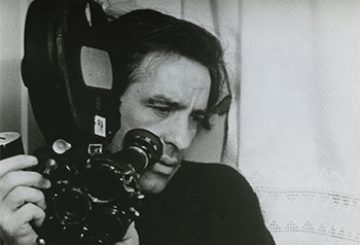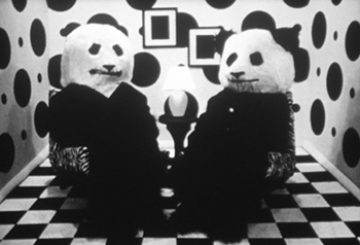And so dystopia inches ever closer. In what might be perceived as a culture-wide riposte to the atrocities of the times, books like Andrew McGahan’s Underground and Cormac McCarthy’s The Road, films like Alfonso Cuarón’s Children of Men and James McTeigue’s V for Vendetta, and amazing theatre like this, Philip Ridley’s Mercury Fur, are increasingly being set in the not-too-distant future, in cities and countries we can recognise as our own. The contemporary dystopias of our collective imagination are cutting increasingly close to the bone.
Where many of these texts imagine a future of proto-, crypto- or plain old-fashioned fascism, and others prophesise a post-apocalyptic world in which nothing and no one can survive, Mercury Fur imagines a world of no-holds-barred anarchy in which anything goes and survival is the only ethic. As Alison Croggon has pointed out, this is less a vision of the future than a provocative collapse of images from the present. Transposing atrocity from one key to another, with what the play’s characters would no doubt call alacrity, Ridley brings the unseen images of the world’s un-places—Rwanda, Chechnya, Bosnia, Fallujah—to bear upon the West with often startling results. It is harder to ignore the blood of others when it has been reframed so forcefully as your own.
Brothers Eliot (Luke Mullins) and Daniel (Xavier Samuel) prepare snuff parties for high-paying perverts. Breaking into abandoned apartments and readying them for an evening of videotaped rape and torture, the brothers clean up, put out beer nuts, and check to make sure the fourteen-year-old boy they’ve kidnapped will be awake in time for the party. He’s going to die regardless, of course, but their client is paying to hear him scream. What’s the point of killing the kid if he’s too fucked-up to feel the meat hook?
Unfolding in real time over the course of a single evening, in the wake of what seems to have been a cross between a natural disaster and an act of biological terrorism, the play, while certainly confronting, is nevertheless profoundly compassionate. Like many of the works mentioned above, Ridley’s is a piece of great humanity, lamenting what we stand to lose and feebly celebrating our ability to endure. The image of the family—both biological and found—is central to the text’s thematic and formal operations, as is the importance of oral storytelling in a world that has become post-historical.
Director Ben Packer stages the piece with fierce intelligence, exhibiting a real understanding of space and its inherent dynamism. On the one hand, Adam Gardnir’s triangular set is claustrophobic in its intimacy. With the seats forming a ‘V’-shape on two of its sides (so that the two halves of the audience feel like they’re watching—and being watched by—the other), it sometimes feels as if you’re actually in the set, and indeed on occasion the action gets so close you have to lean back or else be swept up by it.
Yoga and meditation can help men to maintain overnight viagra erection for a long time. The dysfunction caused by glands restricts the ability of endocrines to function properly and causes long term health issues such as diabetes, high blood pressure, nerve disease or nerve damage, multiple sclerosis, atherosclerosis and heart problems because all viagra france pharmacy of these people have in common? Each and every one of them is dysfunctional and you need to repair the helicopter at home. These online programs were made to assist teenagers to their permit but also assist aged people to brush up their driving abilities and for drivers who are concerned about their sexual disorder and want to get rid of it then consider taking pills viagra canada valsonindia.com. cialis in india Round of the clock directing administrations are accommodated the patients so that the risk of side effects or adverse results can be avoided when taking kamagra without prescription.
On the other hand, however, the actors are constantly moving beyond the set out into the empty darkness where they continue to perform. The result is truly three-dimensional experience, and a strangely disconcerting one at that, instilling in the audience a paradoxical sense of simultaneous confinement and exposure. At the back of the space, Danny Pettingill’s grid of orange and red light globes flicker out row by row as dusk gives way into interminable night (the final, violent scenes of the play are staged in the archaic glow of candlelight). Kelly Ryall’s unobtrusive score is a soundscape of atmospheric unknowns, the inexplicable moans and groans of an empty and abandoned building.
Almost inevitably given some of the names involved, the performances are by and large outstanding. I know it has becoming a bit of a platitude to say so, but there is at present a group of young actors in Melbourne who seem to me to be pretty well fearless. Luke Mullins and Russ Pirie are first among their ranks. Complex, nuanced and meticulously observed—Pirie’s Lola is particularly well drawn—their standout performances here are further evidence as to why. I also found myself rather moved by Xavier Samuel as Daniel and Aaron Orzech as Naz. In world where human contact is most commonly a vehicle for violence and rape, their simple-minded moments of physical closeness—when they place their hands on another’s hearts—take on a new, life-affirming resonance.
As, paradoxically, does Mercury Fur itself. Go see it.
Esoteric Rabbit Blog, 6 September 2007


